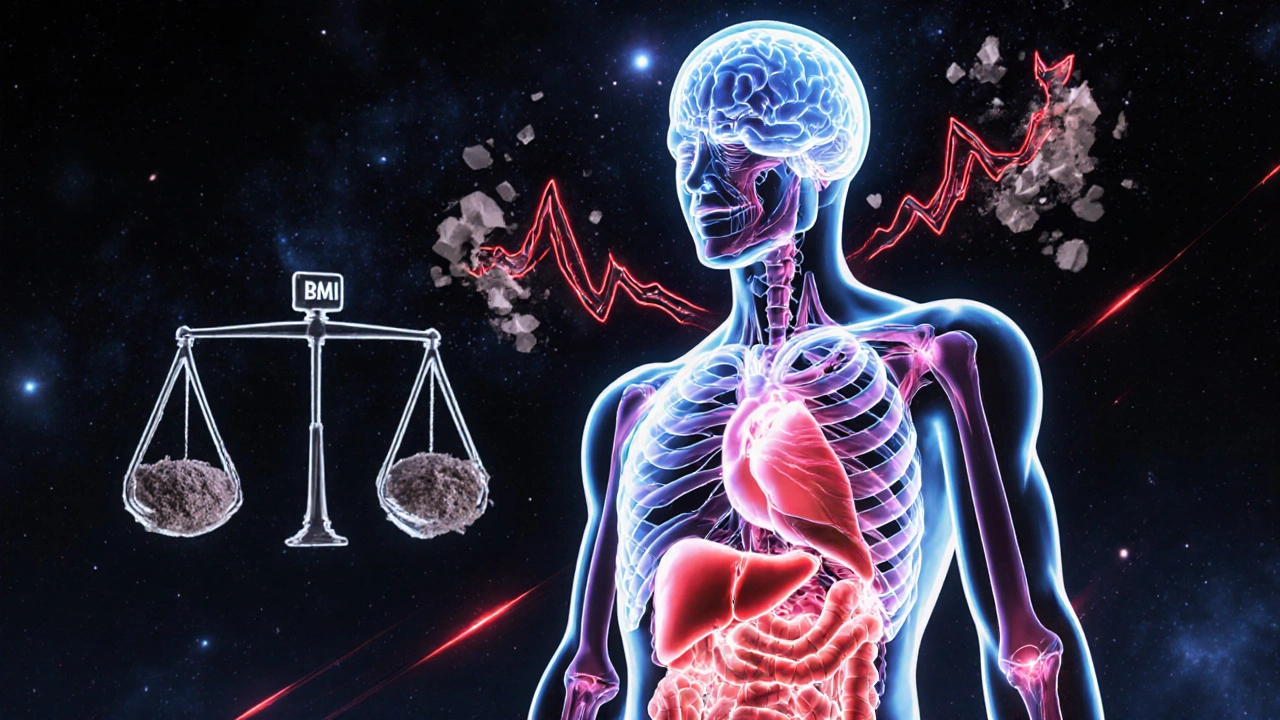Obesity as a Chronic Disease: Understanding Metabolic Health and Effective Weight Strategies

For decades, obesity was seen as a simple matter of eating too much and moving too little. But that view doesn’t match what science now knows. Obesity is not a lifestyle choice. It’s a chronic, progressive disease - just like diabetes or high blood pressure - with deep roots in biology, not willpower.
The American Medical Association officially recognized obesity as a disease in 2013. That wasn’t just a change in wording. It changed how doctors think about it. Instead of telling patients to "just eat less," they’re now trained to look at the underlying causes: hormonal imbalances, genetic risks, brain signaling gone wrong, and fat tissue that turns toxic. This shift matters because treating obesity like a moral failure leads to shame, not healing.
Why Obesity Isn’t Just About Weight
BMI - body mass index - is still the most common tool doctors use to diagnose obesity. If your BMI is 30 or higher, you’re classified as obese. But BMI doesn’t tell you where the fat is, how it’s affecting your organs, or whether your metabolism is broken.
Two people can have the same BMI. One might have fat stored safely under the skin. The other might have fat wrapped around their liver, heart, and pancreas - the kind that triggers inflammation, insulin resistance, and high blood pressure. That’s called visceral fat, and it’s the real danger. People with high visceral fat have up to a 3-fold greater risk of type 2 diabetes and a 2.5-fold higher risk of heart disease, even if their BMI is only in the "overweight" range.
That’s why experts now use tools like waist circumference, body composition scans, and blood markers like C-reactive protein (a sign of inflammation) to get a fuller picture. Someone with a BMI of 32 but normal blood sugar, healthy cholesterol, and no fatty liver might be healthier than someone with a BMI of 28 who has high insulin levels and early signs of metabolic syndrome.
The Biology Behind the Struggle
When you lose weight, your body doesn’t see it as progress. It sees it as starvation.
Your brain has a built-in weight set point - a range it tries to keep your body within. When you lose weight, your body fights back. Ghrelin, the hunger hormone, spikes. Leptin, the hormone that tells you you’re full, drops. Your metabolism slows down. You burn up to 20% fewer calories a day just to stay alive. This isn’t laziness. It’s biology.
Studies show that 90% of people who lose weight through dieting alone regain it within five years. That’s not because they failed. It’s because their biology is working against them. The more weight you lose, the harder your body fights to get it back.
Genetics play a huge role too. Twin studies show that 40% to 70% of your susceptibility to obesity is inherited. Over 250 genes have been linked to body weight. Some affect appetite. Others change how your body stores fat or burns calories. Mutations in the MC4R gene, for example, are found in 2% to 5% of people with severe obesity - and they make hunger signals impossible to ignore.
Then there’s stress. Chronic stress raises cortisol, which increases cravings for sugary, fatty foods. Poor sleep - common in people with obesity - cuts leptin by 18% and boosts ghrelin by 15%. That means you’re hungrier and less satisfied after eating. It’s a cycle: obesity leads to worse sleep, which makes weight loss harder, which makes obesity worse.

Metabolic Health: The Real Goal
Focusing only on the number on the scale misses the point. The real goal isn’t weight loss - it’s metabolic health.
That means: stable blood sugar, normal blood pressure, healthy cholesterol levels, no fatty liver, and low inflammation. Someone can be overweight and metabolically healthy. Someone else can be "normal weight" and have prediabetes, high triglycerides, and fatty liver. That’s called TOFI - thin on the outside, fat inside.
The American Heart Association now recommends screening everyone with obesity for sleep apnea, fatty liver disease, and osteoarthritis. Why? Because these conditions often show up before diabetes or heart disease. Catching them early changes outcomes.
For example, non-alcoholic fatty liver disease affects 75% of people with a BMI over 35. Left untreated, it can lead to cirrhosis. But if caught early and managed with diet, movement, and sometimes medication, it can reverse.
What Actually Works - Beyond Diet and Exercise
Most people think the answer is "eat less, move more." But that’s like telling someone with high blood pressure to just relax. It ignores the biology.
Effective treatment now involves four pillars:
- Medical nutrition therapy - not just "eat vegetables," but personalized plans from a dietitian trained in obesity medicine. Studies show each extra hour of counseling adds 0.23% more weight loss.
- Physical activity - not for calorie burn, but for metabolic improvement. 150 minutes a week of moderate exercise (like brisk walking) improves insulin sensitivity and reduces liver fat, even without weight loss.
- Behavioral counseling - addressing emotional eating, sleep habits, stress, and mindset. A 2021 Mayo Clinic study found 72% of successful outcomes included 12 or more counseling sessions.
- Medication - when needed.
There are now five FDA-approved medications for chronic weight management. The most powerful are GLP-1 receptor agonists like semaglutide (Wegovy) and tirzepatide (Zepbound). In clinical trials, people lost 15% to 20% of their body weight over a year. That’s not magic. It’s biology working with the drug to reduce hunger and improve insulin control.
Side effects like nausea and diarrhea are common - about 65% of users report them - but they usually fade after a few weeks. For many, the trade-off is worth it: better energy, fewer cravings, improved blood sugar, and a real shot at reversing prediabetes.
Bariatric surgery is another option. It’s not a quick fix. It’s a lifelong commitment. About 87% of patients get insurance coverage if they meet criteria (BMI ≥40 or ≥35 with a related condition). Success rates are high - most lose 25% to 35% of their weight and keep it off - but complications like vitamin deficiencies and dumping syndrome happen. Long-term support is critical.

Why Most Treatments Fail - And How to Avoid It
The biggest reason treatment fails isn’t lack of effort. It’s lack of access.
There are only about 1,200 registered dietitians in the U.S. certified in obesity medicine. Most primary care doctors got zero training in obesity during medical school. Only 10% of U.S. medical schools require it.
Insurance coverage is a nightmare. In 37 states, you need prior authorization just to get an obesity medication. Some plans won’t cover it at all. Semaglutide can cost up to $1,400 a month without insurance. That’s not affordable for most people.
And then there’s stigma. A 2022 survey by the Obesity Action Coalition found 67% of people with obesity reported being treated with bias by healthcare providers. One woman said her doctor refused to do a routine mammogram because she was obese. Another was told to lose weight before being treated for knee pain - even though the pain was caused by arthritis, not weight.
Real progress means treating obesity like any other chronic disease: with regular check-ins, evidence-based tools, and compassion - not judgment.
The Future Is Here - But It’s Not Equal
New drugs are coming fast. Retatrutide, a triple agonist approved in July 2023, showed 24.2% average weight loss in early trials - the most effective yet. The ICD-11 now includes detailed obesity staging codes that track fat tissue dysfunction, not just BMI.
But access is uneven. Non-Hispanic Black adults have the highest obesity rate in the U.S. at 49.6%. Hispanic adults are at 44.8%. Non-Hispanic Asian adults are at 17.4%. Yet treatment access doesn’t match those numbers. Rural areas have fewer specialists. Low-income communities have less insurance coverage.
Technology helps. Digital programs like Omada Health show 73% user adherence when combining coaching, tracking, and support. But they’re not a substitute for medical care.
The World Obesity Federation predicts that by 2050, half the world’s population will have obesity. The economic cost will hit $4.32 trillion a year. We can’t treat our way out of this with pills alone. We need better access, better training, and better policies.
For now, the best advice is simple: If you have obesity, you deserve care - not blame. Ask your doctor about metabolic testing. Ask about medications. Ask about behavioral support. Don’t wait until you’re diagnosed with diabetes or heart disease. The tools to manage this disease exist. They’re just not available to everyone yet.
Is obesity really a disease, or just a result of poor choices?
Yes, obesity is officially recognized as a chronic disease by the American Medical Association, the World Health Organization, and the Obesity Medicine Association. It’s caused by complex interactions between genetics, hormones, brain signaling, and environment - not simply lack of willpower. Studies show 90% of people who lose weight through dieting regain it, proving biology plays a dominant role. Blaming individuals ignores the science and increases stigma.
Can you be overweight and still be metabolically healthy?
Yes. Some people with a BMI over 25 have normal blood pressure, healthy cholesterol, no insulin resistance, and no fatty liver. This is called "metabolically healthy obesity." But it’s not permanent. Over time, most will develop metabolic problems unless lifestyle or medical interventions help. The key is not just weight - it’s metabolic markers. A waist measurement over 35 inches for women or 40 inches for men raises risk, even if BMI is normal.
Why do weight loss medications like semaglutide work better than diets?
Diets don’t change your biology. Medications like semaglutide target the brain’s hunger centers and improve insulin sensitivity. They reduce appetite, slow stomach emptying, and help your body use glucose better. Clinical trials show people lose 15-20% of their body weight on these drugs - far more than most diets achieve. And unlike dieting, they don’t trigger the body’s starvation response. They work with your biology, not against it.
Is bariatric surgery safe and worth it?
For people with severe obesity (BMI ≥40 or ≥35 with a health condition), bariatric surgery is one of the most effective long-term treatments. Studies show 70-80% of patients keep off 25-35% of their weight after 10 years. It can reverse type 2 diabetes in up to 80% of cases. But it’s not risk-free. Complications include vitamin deficiencies, dumping syndrome, and the need for lifelong follow-up. Success depends on choosing a certified center and sticking to post-op nutrition and support.
Why don’t more doctors treat obesity like a disease?
Most doctors weren’t trained to treat it. Only 10% of U.S. medical schools require obesity education. Insurance often doesn’t cover medications or counseling. Many still believe it’s about willpower. And stigma runs deep - both in society and in clinics. Patients report being denied care, blamed, or told to lose weight before any other treatment. Changing this requires better training, better policy, and patient advocacy.
What’s the best first step if I think I have obesity?
Don’t start with a diet. Start with a conversation. Ask your doctor for a metabolic panel - check blood sugar, cholesterol, liver enzymes, and inflammation markers. Measure your waist. Ask if you should be screened for sleep apnea or fatty liver. If your BMI is over 30 and you have related health issues, ask about FDA-approved medications or a referral to an obesity medicine specialist. You don’t have to fix everything at once. Small, sustainable changes guided by science work better than drastic diets.






Comments
Manish Pandya
November 24, 2025 AT 16:48Finally someone says it right. I used to think it was just willpower until I saw my dad struggle for 20 years. His body fights him every single day. It’s not laziness. It’s biology. I wish more doctors got this.
My mom had gastric bypass and lost 120 lbs, but she still needs meds and therapy. It’s not a cure. It’s management. Like diabetes.
Emma Hanna
November 26, 2025 AT 16:23Stop making excuses!!! People have been losing weight for centuries without fancy drugs! It’s called discipline! You eat less, move more-end of story! Why are we letting corporations profit off of people’s weakness?!
GLP-1 drugs?!!? That’s just chemical crutches!! You’re not fixing the problem-you’re masking it with a $1,400/month pill!!
Mariam Kamish
November 27, 2025 AT 11:35😭 I just want to feel normal again. I’ve been on Wegovy for 3 months. Nausea was brutal at first. Now? I don’t crave junk. I sleep better. My knees don’t hurt as bad.
But my doctor still acts like I’m asking for a luxury car. Like I’m begging for a miracle. I just want to breathe.
Also… why is this so expensive?? 😤💸
Patrick Goodall
November 27, 2025 AT 19:46They don’t want you to know this… but Big Pharma and the BMI industrial complex are in bed together. They made obesity a 'disease' so they could sell you pills for life. The real cause? Processed food laced with sugar and chemicals since the 80s. They knew. They planned it.
And now they’re pushing GLP-1 drugs like they’re holy water. Meanwhile, your grandma ate lard and lived to 95. What’s really going on here?? 🤔
They’re not treating obesity. They’re selling a lifestyle subscription. 🚨
Kaylee Crosby
November 29, 2025 AT 04:26You’re not alone. Seriously. I was told I needed to 'just try harder' for years. Then I found an obesity medicine specialist. We ran labs. Found my leptin was off. Started metformin + walking 30 mins a day. Lost 40 lbs in 8 months without starving.
It’s not about willpower. It’s about finding the right tools. And you deserve that. Start with your waist measurement. That’s your first step. Not the scale. 💪❤️
Adesokan Ayodeji
December 1, 2025 AT 02:44Bro, in Nigeria, we used to say 'fat is wealth'-but now, with all this processed food coming in, people are getting sick without even knowing why. My cousin, BMI 31, had fatty liver and no symptoms. Doctor said, 'Your blood sugar is acting up.' We changed his diet, added walking, and now his liver enzymes are normal. No meds.
It’s not magic. It’s consistency. Small steps. Maybe you don’t need a pill. Maybe you just need someone to sit with you and say, 'I see you. Let’s try this.'
And if you can get a doctor who gets it? That’s gold. Don’t settle for 'eat less.' Ask for the full picture. Your body is not broken. It’s just misunderstood.
And if you’re reading this and feeling hopeless? I’m proud of you for even clicking on this post. That’s courage. Keep going.
One step. One day. One breath. You got this. 🙏
Karen Ryan
December 2, 2025 AT 16:10I’m from a culture where being thin is seen as 'unhealthy' or 'sick.' My mom used to say, 'Eat more, you look too skinny!' Now I live in the U.S. and everyone’s like, 'You need to lose weight.'
It’s confusing. But this post helped me see it’s not about looks. It’s about health markers. I got my waist measured last week-36 inches. I didn’t realize that was a red flag. Now I’m asking my doctor for a metabolic panel.
Thanks for normalizing this. I didn’t know where to start. 💛
Terry Bell
December 3, 2025 AT 12:43It’s wild how we’ve turned a biological condition into a moral test. Like if you’re fat, you’re weak. If you’re thin, you’re virtuous. But what if your body just doesn’t work the same way as the next person’s?
My uncle had a genetic mutation that made him ravenous. He ate like a bear in hibernation. He wasn’t lazy. He was wired differently. He got on semaglutide and his life changed. He started hiking. He laughed again.
Why do we punish biology? We wouldn’t shame someone for needing insulin. So why do it here?
Maybe the real question isn’t 'why can’t they lose weight?'
It’s 'why won’t we help them?'
Lawrence Zawahri
December 3, 2025 AT 17:33They’re lying to you. This whole 'obesity is a disease' thing? It’s a scam to get you to take pills so they can sell you more. The real cause? GMOs. Fluoride. 5G. The government wants you dependent on Big Pharma. They don’t want you healthy. They want you docile.
And the doctors? They’re paid off. Every time you walk into that clinic, you’re walking into a corporate trap.
Just eat real food. Walk outside. Stop believing the lies. Your body knows how to heal itself. You just have to break free from the system.
They don’t want you to know this. That’s why they’re pushing these drugs. 🚨
Benjamin Gundermann
December 4, 2025 AT 18:50Look I get it. People are tired of being shamed. But let’s be real here. This country is built on convenience. Fast food. Soda. Sitting. We’re not gonna fix obesity by handing out pills. We need to fix the food system. The subsidies. The ads. The schools. The lack of parks.
Why is a bag of chips cheaper than an apple? Why is the only exercise program on TV a 30-day ab challenge? We’ve turned health into a consumer product.
And now we’re treating the symptom with a $1,400 pill while the whole damn system is rotting.
Yeah, the science is cool. But if you don’t fix the environment, you’re just putting a bandaid on a bullet wound.
And don’t get me started on how they market these drugs like they’re the new iPhone. 'Lose 20% of your weight!' Like it’s a sale. It’s not a product. It’s a medical intervention.
We need policy. Not pills. We need change. Not capitalism.